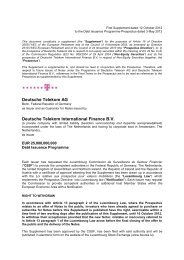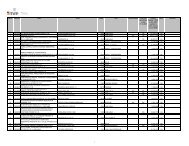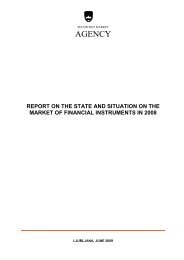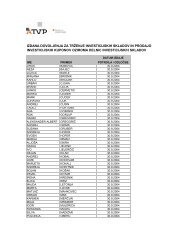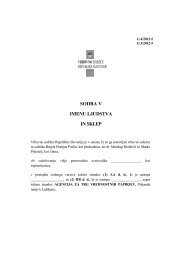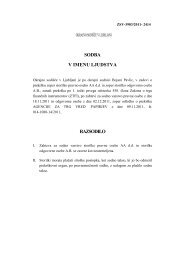Prospectus-Final (clean) - Malta Financial Services Authority
Prospectus-Final (clean) - Malta Financial Services Authority
Prospectus-Final (clean) - Malta Financial Services Authority
- No tags were found...
Create successful ePaper yourself
Turn your PDF publications into a flip-book with our unique Google optimized e-Paper software.
The decline in wholesale revenue in 2011 and 2010 was primarily attributable to regulatory price cutsfor digital leased lines, unbundled local loop lines and interconnection calls (from 1 July 2011) as wellas the declining use of interconnection calls. The decline in revenue was partially offset by a positivetrend in the volume of unbundled wholesale lines.The decline in digital services revenue in 2011 resulted primarily from the discontinued use of prepaidmobile cards of other carriers. The increase in revenue in 2010 resulted from the Scout group and thefirst time consolidation of ClickandBuy as of 1 April 2010.Declining revenues from Value-Added <strong>Services</strong> in 2011 and 2010 resulted from a lower use ofpremium rate call numbers, such as directory inquiry services, and of public telephones.In 2012, activities and functions previously reported under digital services in the Germany operatingsegment (essentially, the Load and Scout businesses) will be transferred and reported under GroupHeadquarters & Shared <strong>Services</strong>. For 2012, Deutsche Telekom expects total revenue for theGermany operating segment to decline compared with the prior year, mainly due to anticipatedregulatory decisions, a decline in revenues in traditional voice telephony and the transfer of digitalservices described above. Deutsche Telekom expects ongoing growth in data revenues to partiallyoffset this decline.- Adjusted EBITDAThe slight decline in adjusted EBITDA in 2011 resulted from the decline in revenues. However, despitethe decline in revenue of EUR 1.1 billion, the decline in adjusted EBITDA was only EUR 19 million,largely due to Deutsche Telekom's focus on value-driven business development and costmanagement. Deutsche Telekom reduced its operating costs with a range of measures in the fields oftechnology and sales and by streamlining its support processes. In addition, Deutsche Telekomdiscontinued selling prepaid mobile cards of its competitors, which also had a positive effect.Despite the decline in total revenue in 2010, adjusted EBITDA remained stable as a result of twooffsetting effects. Adjusted EBITDA at Deutsche Telekom's mobile communications businessincreased mainly as a result of large-scale projects to improve its customer service and implementcost management programs, such as sending invoices by email and increasing the efficiency ofDeutsche Telekom's advertising and communication activities. In addition, Deutsche Telekom's mobileoperations improved their use of office and warehouse space. Despite the increased marketing ofsmartphones, Deutsche Telekom reduced its operating costs by approximately EUR 0.5 billion in 2010through a range of initiatives in business areas such as production, sales, service, marketing, and IT.This increase was offset by a decline in adjusted EBITDA at Deutsche Telekom's fixed-networkbusiness as a result of the revenue developments described above.For 2012, Deutsche Telekom expects a largely stable adjusted EBITDA in the Germany operatingsegment.- Profit from OperationsThe decrease in profit from operations in 2011 was primarily attributable to higher depreciation,amortisation and impairment losses as well as early retirement expenses. Increased depreciation,amortisation and impairment losses mainly related to intangible assets, due in part to the capitalisationof LTE licenses in 2010.The decrease in profit from operations in 2010 was mainly due to an increase in staff-relatedexpenses, primarily for early retirement and severance payments. In addition, the write-off ofreceivables from the German Main Customs Office relating to the 2005 to 2009 tax years also led tothe decline.- Cash capexIn 2011, Deutsche Telekom primarily invested in network infrastructure, including the VDSL networkand connecting base stations with high bit rates, and in the transmission network to support 4Gservices. The overall decrease in Deutsche Telekom's cash capex was due to the cash outflow for theacquisition of LTE licenses in 2010 as described below.The increase in Deutsche Telekom's 2010 cash capex was mainly a result of the mobile frequencyspectrum purchased at the auction in March 2010 to roll-out LTE, which is the basis for the futureexpansion of mobile Internet, especially in rural areas. Deutsche Telekom also increased expenditure84




